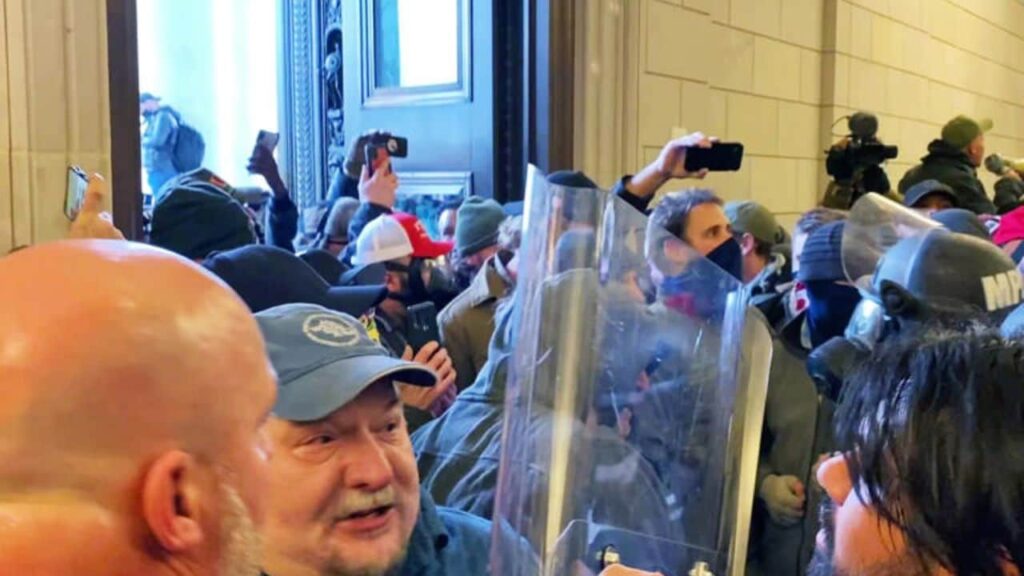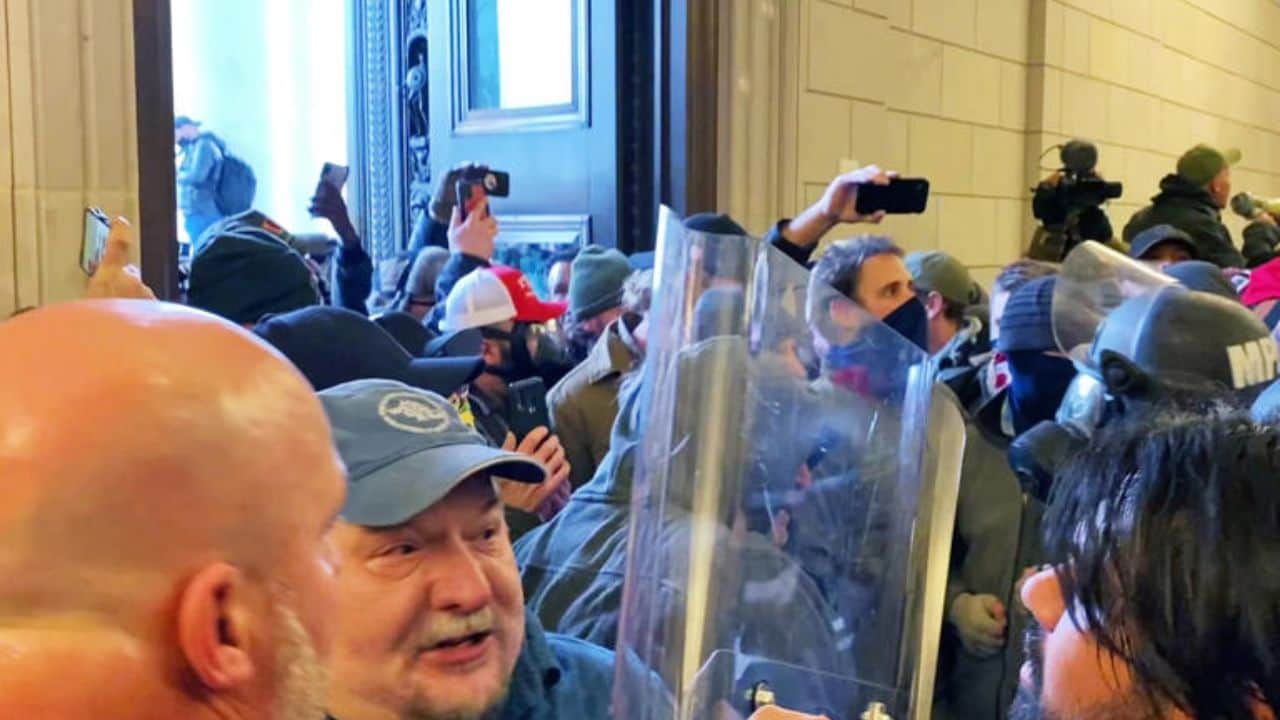Supreme Court, Jan. 6 riot, Joseph Fischer, obstruction charge, Capitol riot, Sarbanes-Oxley Act, Justice Department, Merrick Garland, Donald Trump, Chief Justice John Roberts, Ketanji Brown Jackson, Amy Coney Barrett
The Supreme Court has ruled in favor of Jan. 6 rioter Joseph Fischer, challenging an obstruction charge. This decision has significant implications for similar cases, including those involving former President Donald Trump. Learn more about the ruling and its impact on ongoing prosecutions.

Supreme Court Rules for Jan. 6 Rioter Challenging Obstruction Charge
On Friday, the Supreme Court ruled in favor of Joseph Fischer, a former police officer, who challenged an obstruction charge stemming from his involvement in the January 6, 2021, Capitol riot. The ruling, delivered by a 6-3 vote on nonideological lines, has significant implications for the hundreds of defendants, including former President Donald Trump, charged with obstructing an official proceeding related to the certification of President Joe Biden’s election victory.
Background of the Case
Joseph Fischer, like many others involved in the January 6 Capitol breach, was charged under a provision of the Sarbanes-Oxley Act of 2002. This law, originally enacted in the wake of the Enron accounting scandal, includes a provision that targets anyone who “obstructs, influences, or impedes any official proceeding, or attempts to do so.” Prosecutors had applied this provision broadly to cover the actions of individuals like Fischer who participated in the riot.
However, the Supreme Court concluded that the provision was intended to apply to more specific instances of evidence tampering, rather than the broader array of actions cited by prosecutors. The ruling effectively narrows the scope of the law, limiting its application to cases involving the impairment of records, documents, objects, or other materials used in an official proceeding.
The Supreme Court’s Decision
Chief Justice John Roberts, writing for the majority, stated that the government’s broad interpretation of the law “defies the most plausible understanding” of the statute. Roberts emphasized that the Justice Department’s view would “criminalize a broad swath of prosaic conduct, exposing activists and lobbyists alike to decades in prison.” To secure a conviction under this statute, prosecutors now must demonstrate that the defendant impaired the availability or integrity of materials used in an official proceeding.
The majority opinion was joined by four other conservative justices and one liberal, Justice Ketanji Brown Jackson. Jackson, while concurring with the majority’s interpretation, noted in a separate opinion that Fischer’s conduct could still fall under the narrower application of the law. The dissenting opinion, written by conservative Justice Amy Coney Barrett and joined by two liberal justices, argued that the majority failed to respect the legislative intent behind the statute, which was meant to cover a wide range of obstructive conduct.
Implications for January 6 Cases
Attorney General Merrick Garland expressed disappointment in the Supreme Court’s decision, highlighting its potential impact on the Justice Department’s January 6 cases. Garland noted that the ruling “limits an important federal statute that the department has sought to use to ensure that those most responsible for that attack face appropriate consequences.” However, he stressed that the decision would not affect the bulk of the cases.
The Supreme Court’s ruling specifically affects Fischer’s obstruction charge, one of seven criminal charges he faces. Even if the obstruction charge is ultimately dismissed, Fischer still faces other charges, including assaulting a police officer and entering a restricted building. The Justice Department may still pursue prosecution under the new interpretation of the law, depending on the specifics of each case.
Broader Impact on Trump and Other Defendants
The ruling’s implications for former President Donald Trump’s case are still uncertain. Trump faces multiple charges, including one count of obstructing an official proceeding. Prosecutors have indicated that even if Fischer’s challenge is successful, Trump’s conduct may still be prosecutable under the narrower interpretation of the statute.
In a separate but related case, the Supreme Court is considering Trump’s claim of presidential immunity in the election interference case. The outcome of this case could further influence the charges against Trump and the proceedings leading up to his trial.
Responses and Reactions
The Supreme Court’s decision has prompted varied reactions from different quarters. Supporters of the ruling argue that it prevents the overreach of prosecutorial power and ensures that criminal statutes are applied narrowly and appropriately. Critics, on the other hand, contend that the ruling undermines efforts to hold accountable those who orchestrated or participated in the January 6 attack on the Capitol.
The ruling has immediate consequences for the 247 cases of the more than 1,400 January 6 defendants that might be affected. Among these, only 52 cases involve obstruction as the sole felony offense, and just 27 of those defendants are currently serving sentences. The ruling may prompt reevaluations of these cases, but many defendants also face additional charges that will not be impacted by the Supreme Court’s decision.
The Path Forward
As the cases affected by this ruling proceed through lower courts, the Justice Department will need to adjust its strategies in light of the Supreme Court’s interpretation. Judges in recent January 6 trials have already been considering the potential impact of the Fischer decision in their sentencing, often emphasizing that their decisions would remain unchanged regardless of the Supreme Court’s ruling.
The ruling underscores the importance of precise legislative language and judicial interpretation in criminal law. It also highlights the ongoing challenges in prosecuting complex cases arising from unprecedented events like the January 6 Capitol riot.
Conclusion
The Supreme Court’s ruling in favor of Joseph Fischer represents a significant development in the legal proceedings related to the January 6 Capitol riot. By narrowing the application of the Sarbanes-Oxley Act’s obstruction provision, the Court has set a precedent that will influence the prosecution of similar cases. While the decision poses challenges for the Justice Department, it also reaffirms the necessity of clearly defined legal standards to ensure fair and just application of the law.
As the legal landscape continues to evolve, the outcomes of these cases will shape the broader narrative of accountability and justice in the aftermath of the January 6 events. The Supreme Court’s decision serves as a reminder of the complexities inherent in the intersection of law, politics, and societal impact.
Read More
- Understanding POTS: Christina Applegate Daughter Sadie Opens Up About Her Diagnosis
- Bolivia Coup Attempt Fails: Military Flees, General Arrested Amid Political Tensions
- Google Translate Adds Support for 110 Languages in Largest Expansion Ever
- UN Security Council Passes U.S.-Drafted Cease-Fire Resolution to End Israel-Hamas Conflict
